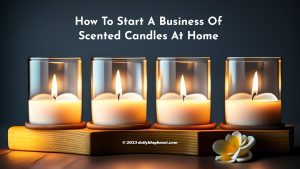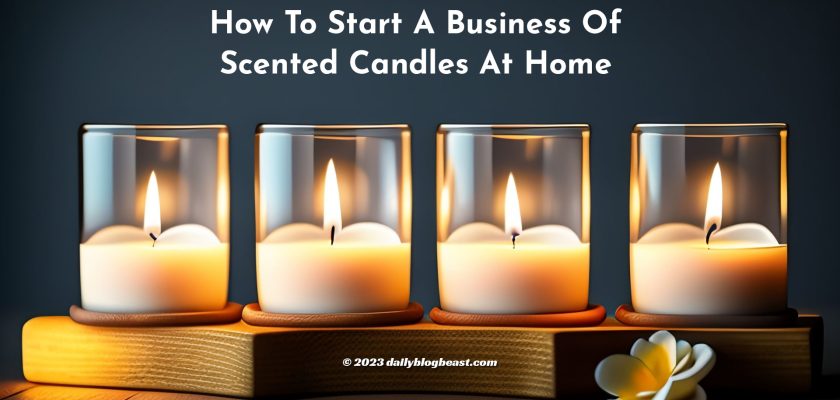Starting a scented candle business at home might seem like a difficult task, but you can make it easy if you already know how to start a scented candle business at home.
People are increasingly interested in working from home selling candles, whether as a new method to earn money or enjoy some creative escapism.
Are you a candlemaker by trade? this step-by-step guide for scented candles will show you how to convert your passion into a business.
Read our step-by-step guide to making your own candles and selling them from the comfort of your own home.
Step-by-step guide for starting a candle-making business:
1. Design attractive candles:
2. Making First Candle:
3. Name Your Business:
4. Find Your Niche:
5. Write Business Plan and Budget:
6. Purchase the Right Equipment:
7. Check Legal Requirements:
8. Organize Insurance:

1. Design Attractive Candles:
Design your candles in an attractive way that impresses others and looks beautiful. Most likely, you’re interested in manufacturing candles as a side hustle or full-time company because you enjoy designing and making them.
Create eye-catching goods by combining shape, aroma, and color in candle manufacturing.
picture memories may be used to create customized candles
The possibilities are endless. Create candles that are inspired by everything from dessert to landscapes.
2. Making Your First Candle:
Making your first candle will help you learn the process and make it as efficient and more straightforward as a homemade business. Do you intend to make your own candles? A workshop or other business space is also an option. YouTube provides several excellent video instructions on how to manufacture candles at home, regardless of the method.
In the same way that baking is crucial, the temperature and ingredients must be just right to avoid lumpy wax.
A small group of target consumers might be surveyed at this stage to provide feedback. You will be able to assess your original thoughts and bring the best version to market if you do an extensive research during the product development phases.
Expanding your products:
Consider expanding your product line once your candle-making skills have been honed. To produce wax melts, for example, you won’t need anything additional.
How to make wax melts to sell:
Warming wax melts with a tealight, or a burner releases the aroma. Moreover, they’re quite easy to make:
A pot of water should be brought up to a simmer.
With a spoon, swirl the wax in a heatproof bowl over the saucepan.
Add your own essential oils or fragrances.
Pour melted wax into ice cube trays and freeze for many hours.
3. Business Name:
A name has a lot of meaning. It communicates your brand’s individuality and helps you stand out from your rivals… Awareness of intellectual property and copyright laws is also recommended.
Consider choosing a unique name
Consider SEO
Check out if Web domain is available
Don’t limit yourself
4. Find your niche:
Candles that are eco-friendly What about scented candles? What are some examples of luxury candles? Identify your product and target audience, and then go forward.
Whether you want to find out if there are any holes in the market, you should look at what your competition is doing. A SWOT analysis of your firm and your key rivals may be helpful in identifying important areas to focus on.
More advice may be found in our guide to launching a company from home.
5. Write a business plan and budget:
We could all do without business administration, but business plans enable you to grasp your purpose, strategic objectives, and even who you’re up against as a rival. Also, if you’re going to apply for start-up financing, this might be helpful.
Next, you’ll want to think about expenses and create a budget for the project.
Depending on the materials you choose, the initial start-up expenses for a candle making business might be as little as £50.
Costs of set-up (including equipment and supplies)
your product’s manufacturing time
Each candle’s production cost
If you’re selling online, consider delivery expenses.
6. Buy the Right Candle Making Machine:
1. Candle Wax: coconut wax, soy wax, and other https://suppliesforcandles.co.uk/module/xtsearchforalgolia/instantsearch?sfc_production%5Bquery%5D=Soy%20wax
2.Candle Wicks: made of cotton or paper
https://suppliesforcandles.co.uk/module/xtsearchforalgolia/instantsearch?sfc_production%5Bquery%5D=candle%20wicks
3.Scents: organic fragrances
https://suppliesforcandles.co.uk/module/xtsearchforalgolia/instantsearch?sfc_production%5Bquery%5D=3.%09Scents
4.Dyes: liquid or powdered dyes to add in wax
https://suppliesforcandles.co.uk/module/xtsearchforalgolia/instantsearch?sfc_production%5Bquery%5D=dyes
5.Molds: comes in all sizes and shape
https://suppliesforcandles.co.uk/module/xtsearchforalgolia/instantsearch?sfc_production%5Bquery%5D=moulds
6.Candle Glasses: an alternative to molds
https://suppliesforcandles.co.uk/module/xtsearchforalgolia/instantsearch?sfc_production%5Bquery%5D=candle%20glasses
7.Thermometer: ensure wax doesn’t heat above 80 c
https://suppliesforcandles.co.uk/module/xtsearchforalgolia/instantsearch?sfc_production%5Bquery%5D=thermometer%20
8.Saucepan and heatproof bowl: double boiler method
https://suppliesforcandles.co.uk/module/xtsearchforalgolia/instantsearch?sfc_production%5Bquery%5D=thermometer%20
7. Lookout for legal requirements for selling candles:
If you want to sell candles legally in the UK, you need to be aware of the following:
Check out the government’s product safety advice in the General Product Safety Regulations 2005.
Your local trading standards office can provide particular recommendations.
The British Candlemakers Federation has released guidelines for candle manufacturers on product testing and safety labeling.
8. Organize Insurance:
In either case, your consumers will demand that your items be safe. Crafters should be insured for this reason.
Public Liability Insurance: you want to be prepared if a member of the public is harmed in your store, for example, by tripping.
Product Liability Insurance: for example, if your candle contains dangerous chemicals and results in damage or financial loss
Stock Insurance: Stocks should be protected when being stored.

